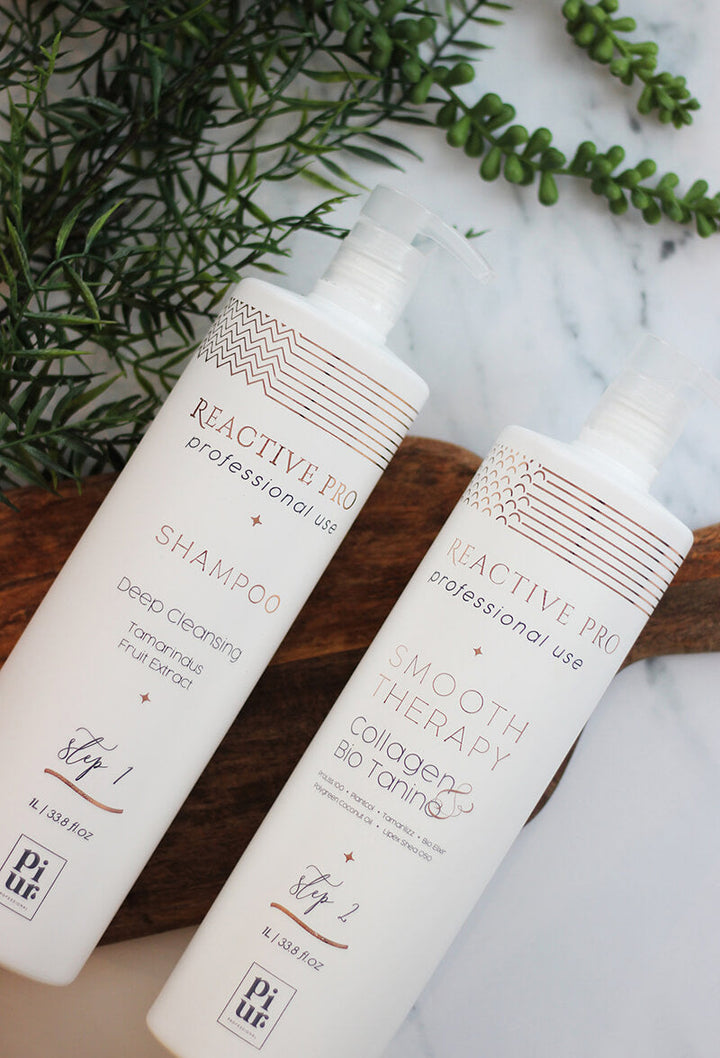Sulfate-Free vs. Salt-Free Shampoo: What’s The Difference?
At this point, many people began to question whether we needed to steer clear of sulfates in our shampoo. Although, not everyone has started to question the presence of salt in their hair-washing routine.
Sulfates and sodium chloride are commonly found on hair care labels, so it’s important to have all the information before you put your trust in a product. Learn more about what these two ingredients are, why they are in your shampoo, and what it means for your hair.
What Are Sulfates?
If you’ve seen the name “sodium lauryl sulfate” on your products, you may have second-guessed your purchase. Sulfates are a type of chemical used for cleaning and are known as strong surfactants. They are found in anything from home cleaning products to your shampoo. They help to remove dirt and oil while producing a lather effect in products.

Despite sharing the presence of sodium, sulfates are different from regular salt. There are multiple types of sulfates that you may find in your shampoo. Some of the names you might come across include:
- Diethanolamine (DEA)
- Triethanolamine (TEA)
- Sodium Laureth Sulfate
- Disodium Laureth Sulfosuccinate
Is There Salt in My Shampoo?
Although you are more familiar with it on your dinner table, salt can be found in your shampoo as well, and it is used more often than you think. The truth is that it’s a cheap and easy ingredient that acts as a strong surfactant for your hair, although not as strong as sulfates. Salt, also known as sodium chloride, opens up the hair cuticle, increasing the ability of products to remove dirt and pollutants.
Salt is also used in products because it helps reinforce the texture and health of the formula. The ingredient helps to thicken shampoo and acts as a preservative, preventing the ingredients from becoming inactive or developing mold.

Having salt in your shampoo can provide a few benefits. After all, salt is a natural mineral. In general, salt helps minimize swelling, soothe rashes, treat wounds, and cleanse the skin. As a result, sodium chloride can also be good for your scalp.
Even though salt can benefit your scalp, it may not be the best for your hair strands. Although it is found in more than a few hair care products, there are some reasons why you might want to be wary of it.
What Are the Risks of Each?
Consumers’ turn against sulfates and sodium-filled shampoos has to have some reason behind it. Both ingredients have reasons for being put in your hair, but they also have considerations for why they shouldn’t be.
-
Risks of Sulfates
Sulfates typically present a larger risk than salt in hair care products as they can have a wide range of side effects. These compounds can dry out the hair, making it more vulnerable to damage and breakage. Shampoos that contain sulfates can also cause color fading and leave you with dull, thin, damaged hair.
Sulfates are particularly harmful to naturally dry and fragile hair, including curly hair types. Sensitive hair types are far more susceptible to the risks that sulfates bring.

Unlike salt, sulfates do not have many redeeming qualities for the scalp either. These drying effects extend down to the scalp, risking irritation, itching, and flaking. Therefore, if you have a sensitive hair type or a sensitive scalp, you should be extra mindful when choosing products.
-
Risks of Salt
Despite the benefits of adding sodium chloride, there are considerations to make for not putting it in your hair. Overall, sodium chloride is considered low-risk for your hair, but that does not make it an ideal ingredient for your shampoo.
For example, if you consume a lot of salt or sodium in your food, then you are going to start to feel dehydrated. This is because sodium chloride has qualities that cause it to absorb water from its surroundings. As a result, anything with sodium chloride as an ingredient runs the risk of sucking moisture out of your hair.
Salt also harms the keratin in your hair. Keratin is a natural protein found in hair, and it keeps your hair strong and protects it from damage. Salt can break down the natural keratin and lead to damage. Fortunately, a keratin-rich shampoo can help restore the damage done.

Those with curly hair need to be especially careful about turning to salt-containing products. Curly hair already has a tendency to be dry, so introducing salt will not help. Dry hair is at greater risk for damage, and using products with salt on the ingredient list can make this problem even worse.
Should I Choose Salt-Free and Sulfate-Free Shampoos?
Ultimately, you do not have to rush to throw away any shampoo in your shower that contains salt or sulfates, especially if it works for your hair. After all, these ingredients are not going to make your hair fall out instantaneously. Unless you have extremely dry, fragile hair, you can comfortably continue to use products with salt.
However, the truth is that these ingredients aren’t really necessary, especially now that there are so many hair care ingredients available. As a result, many hair care professionals would recommend seeking alternative products when possible. Many salt and sulfate-free shampoos have ingredients that can clean your hair just as well.
For the best results, you should choose wholesome products that use only natural ingredients designed to nourish your scalp and hair strands. For example, brands like Piur or Brasil Cacau have shampoos that are made to preserve the health and hydration of your hair, avoiding ingredients that strip hair of its natural oils.

